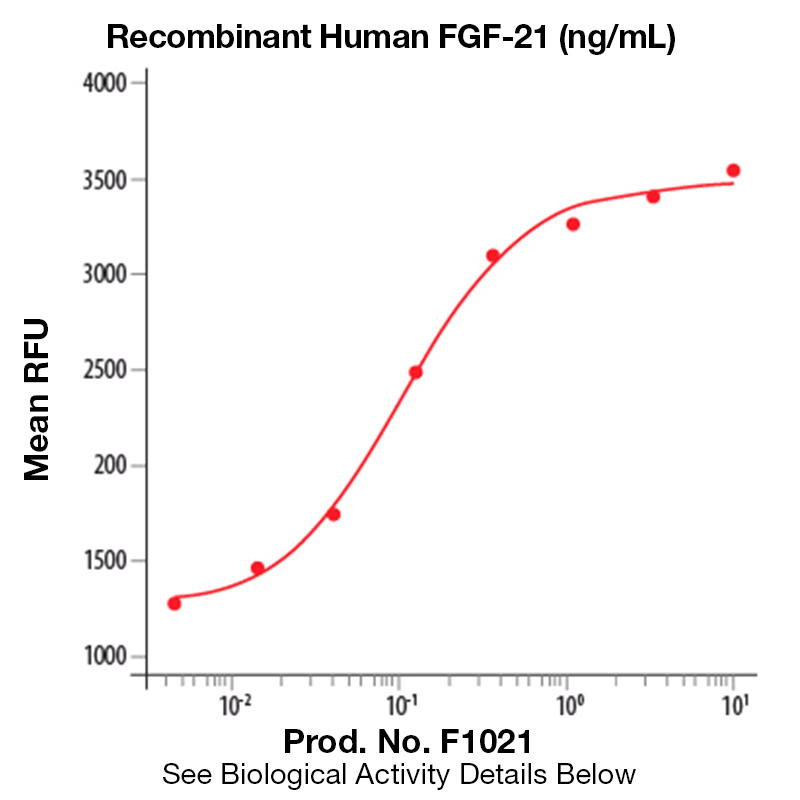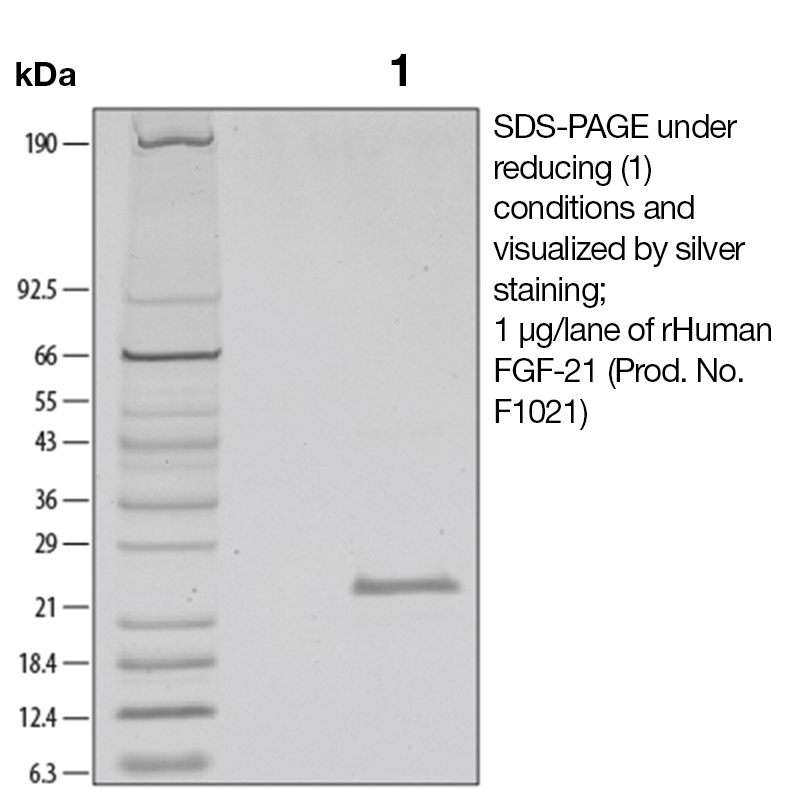Recombinant Human FGF-21
Data
- -
- -
BackgroundFibroblast growth factor 21 (FGF-21), is a secreted member of the fibroblast growth factor (FGF) family. FGF family members possess broad mitogenic and cell survival activities and are involved in a variety of biological processes including embryonic development, cell growth, morphogenesis, tissue repair, tumor growth and invasion (1). FGF-21 mRNA is most abundant in the liver. It is induced by a nuclear receptor heterodimer that includes RXR and utilizes Klotho family members for signal transduction. FGF-21 signals through the FGFR1c and FGFR4 receptors and stimulates insulin independent glucose uptake by adipocytes (2). It shows poor binding to the ECM and limited binding to heparin. FGF-21 decreases the expression of IGF-1, induces hepatic expression of IGFBP1 and blunts growth hormone signaling (3). Thus, FGF-21 may play a central role in inhibiting growth as part of its broader role in inducing the adaptive response to starvation. FGF21 has the potential to become a powerful therapeutic to treat hepatic steatosis, obesity and type 2 diabetes (4). Protein DetailsPurity >97% by SDS-PAGE and analyzed by silver stain. Endotoxin Level <0.01EU/µg as determined by the LAL method Biological Activity The biological activity of Human FGF-21 was determined by a cell proliferation assay using human FGF RIIIc transfected BaF3 mouse proB
cells. The expected ED<sub>50</sub> is 0.06 - 0.4 μg/ml in the presence of rmKlotho β and Heparin.
Fusion Protein Tag Histidine Tag Protein Accession No. Amino Acid Sequence hhhhhhp ipdsspllqf ggqvrqryly tddaqqteah leiredgtvg gaadqspesl lqlkalkpgv iqilgvktsr flcqrpdgal ygslhfdpea csfrellled gynvyqseah glplhlpgnk sphrdpaprg parflplpgl ppalpeppgi lapqppdvgs sdplsmvgps qgrspsyas N-terminal Sequence Analysis His State of Matter Lyophilized Predicted Molecular Mass The predicted molecular weight of Recombinant Human FGF-21 is Mr 20.2 kDa. However, the actual molecular weight as observed by migration on SDS-PAGE is Mr 24 kDa (reducing conditions). Predicted Molecular Mass 20.2 Formulation This recombinant protein was lyophilized from a 0.2 μm filtered solution in MES, sodium sulphate (Na2SO4), ethylenediaminetetraacetic acid (EDTA), and dithiothreitol (DTT). Storage and Stability This lyophilized protein is stable for six to twelve months when stored desiccated at -20°C to -70°C. After aseptic reconstitution, this protein may be stored at 2°C to 8°C for one month or at -20°C to -70°C in a manual defrost freezer. Avoid Repeated Freeze Thaw Cycles. See Product Insert for exact lot specific storage instructions. Country of Origin USA Shipping Next Day Ambient NCBI Gene Bank References & Citations1. Itoh, N. et al. (2000) Biochim. Biophys. 1492:203 2. Shanafelt, AB. et al. (2005) J. Clin. Invest. 115:162 3. Inagaki, T. et al. (2008) Cell Metab. 8:77 4. Véniant, MM. et al. (2009) Diabetes 58:250 Certificate of AnalysisIMPORTANT Use lot specific datasheet for all technical information pertaining to this recombinant protein. |
Related Products
- -
- -
Prod No. | Description |
|---|---|
F1116 | |
F1129 | |
F1130 | |
F1021 | |
F1122 |
 Products are for research use only. Not for use in diagnostic or therapeutic procedures.
Products are for research use only. Not for use in diagnostic or therapeutic procedures.




